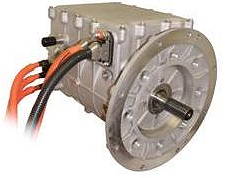Yaskawa has used the new design to build a prototype motor with a continuous output of 45kW (80kW peak) and a maximum torque rating of 200Nm. The motor, which weighs about 60kg, is designed to operate at a top speed of 1,200 rpm.
The IPM (interior permanent magnet) motor has ferrite magnets embedded in its rotor. Its stator coil density has been increased by using rectangular wires, and the rotor’s magnetic circuit has been optimised to produce a motor with comparable external dimensions to a similarly-rated machine based on neodymium magnets. The motor has been designed for automated manufacturing.

Yaskawa says that optimising the form and placement of the magnet and core in the IPM structure using the ferrite magnets enhances the motor’s torque characteristics and tackles the problem of low-temperature demagnetisation. The stator’s lamination factor is claimed to be about 30% higher than usual.

